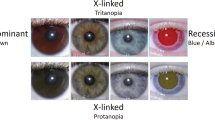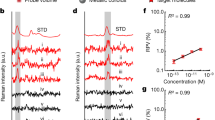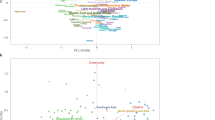Abstract
IT has been known for more than 40 years that the oxygen dissociation curve of blood from newborn infants is displaced to the left of that for maternal blood1,2. Although erythrocytes of the foetus contain predominantly haemoglobin F, whereas the maternal red cells contain almost exclusively haemoglobin A, the different oxygen dissociation curves of maternal and foetal blood have not in general been attributed to the type of haemoglobin in the erythrocytes. This conclusion has been based principally on the following two observations: first, identical oxygen dissociation curves were obtained with haemoglobin solutions prepared from the blood of newborn infants and normal adults3; second, the whole blood of an adult patient whose red blood cells contained 69 per cent haemoglobin F was observed to have an oxygen affinity identical to that obtained with blood of normal adults4.
This is a preview of subscription content, access via your institution
Access options
Subscribe to this journal
Receive 51 print issues and online access
$199.00 per year
only $3.90 per issue
Buy this article
- Purchase on Springer Link
- Instant access to full article PDF
Prices may be subject to local taxes which are calculated during checkout
Similar content being viewed by others
References
Litarczek, C., Soloboziano, H., Aubert, H., and Cosmulesco, I., CR Soc. Biol., 104, 710 (1930).
Haselhorst, G., and Stromberger, K., Z. Geburtshilfe Gynaekol., 98, 49 (1930).
Allen, D. W., Wyman, jun., J., and Smith, C. A., J. Biol. Chem., 203, 81 (1953).
Schrueffer, J. J. P., Heller, C. J., Battaglia, F. C., and Hellegers, A. E., Nature, 196, 550 (1962).
Nechtman, C. M., and Huisman, T. H. J., Clin. Chim. Acta, 10, 165 (1964).
Hořejší, J., and Komárková, A., Clin. Chim. Acta, 4, 391 (1959).
Seeds, A., Hellegers, A., and Battaglia, F., Amer. J. Obst. Gynecol., 103, 68 (1969).
Benesch, E., and Benesch, R. E., Biochem. Biophys. Res. Commun., 26, 162 (1957).
Chanutin, A., and Curnish, R. R., Arch. Biochem. Biophys., 121, 96 (1967).
Zipursky, A., LaRue, T., and Isreals, L. G., Canad. J. Biochem. Physiol., 38, 727 (1960).
Bauer, Ch., Ludwig, I., and Ludwig, M., Life Sci., 7, 1339 (1968).
Bauer, Ch., Ludwig, M., Ludwig, I., and Bartels, H., Resp. Physiol., 7, 271 (1969).
Tyuma, I., and Shimizu, K., Arch. Biochem. Biophys., 129, 404 (1969).
Edwards, M. J., and Martin, R. J., J. Appl. Physiol., 21, 1898 (1966).
Bartlett, G. R., J. Biol. Chem., 234, 469 (1959).
Prystowsky, J., Hellegers, A., Cotter, J., and Bruns, P., Amer. J. Obst. Gynecol., 77, 585 (1959).
Author information
Authors and Affiliations
Rights and permissions
About this article
Cite this article
MAURER, H., BEHRMAN, R. & HONIG, G. Dependence of the Oxygen Affinity of Blood on the Presence of Foetal or Adult Haemoglobin. Nature 227, 388–390 (1970). https://doi.org/10.1038/227388a0
Received:
Revised:
Issue Date:
DOI: https://doi.org/10.1038/227388a0
This article is cited by
Comments
By submitting a comment you agree to abide by our Terms and Community Guidelines. If you find something abusive or that does not comply with our terms or guidelines please flag it as inappropriate.



